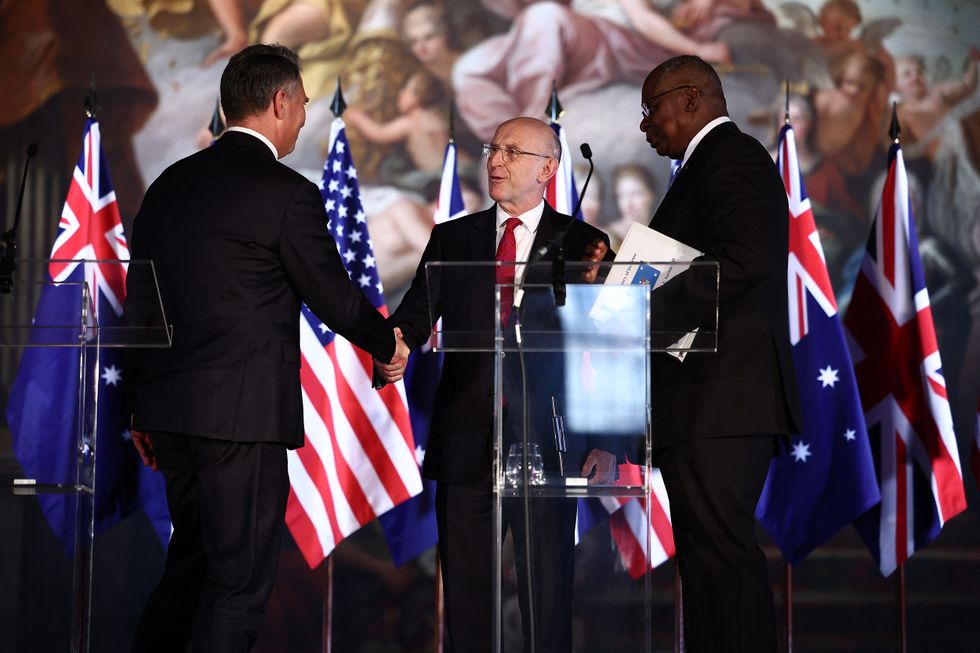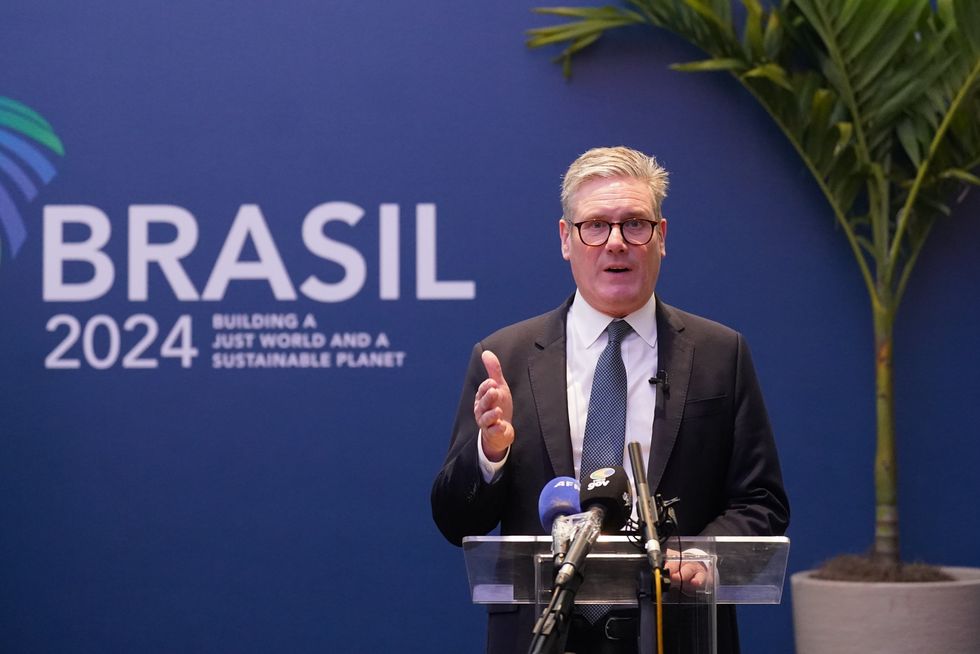Jack Walters
Guest Reporter
Sir Keir Starmer has been warned that China and Russia's ever-extending influence over developing nations is putting Britain's security at risk after Mongolia appeared to pivot away from the West in a potential blow to the Aukus defence pact.
Current and former MPs have expressed their concern to GB News over the Mongolian government's growing relationship with both Moscow and Beijing just days after the Prime Minister met with Xi Jinping.
The move is of particular significance to Aukus - which saw the UK, US and Australia forge closer ties on building nuclear submarines - after ex-Industry Minister Nusrat Ghani visited Mongolia in 2023 to promote securing a critical mineral supply chain.
Speaking to GB News, Sir Conor Burns said: "As a key supplier of the critical minerals which will power the global energy transition the Mongolian government should be positioning itself to maximise its advantage and attract inward investment not deter it.

"The critical minerals supply is also essential to Aukus and the UK Government must not turn a blind eye to this."
During the UK visit to Mongolia last year, Ghani highlighted how the world is becoming increasingly dependent on critical minerals, with a fourfold increase expected by 2040.
Ulaanbaatar is looking to reduce the influence of foreign companies bankrolling strategic assets in Mongolia.
The proposed Minerals Law amendment would force private owners of designated strategic assets to reduce their ownership to a maximum of 34 per cent.
Some of the implicated mines are partially owned by Western companies, including the UK's Rio Tinto.
Burns added: "I am disappointed to learn of the Mongolian government’s proposed Minerals Law amendment, which will expropriate mining assets, including those belonging to foreign companies, in order to establish a Sovereign Wealth Fund.
LATEST DEVELOPMENTS:

"As a key supplier of the critical minerals which will power the global energy transition, the Mongolian government should be positioning itself to maximise its advantage and attract inward investment, not deter it."
Adam Holloway, who previously headed up the all-party parliamentary group for Mongolia, added: "While creating a Sovereign Wealth Fund is a worthy endeavour, the new Minerals Law is the wrong way to go about it.
"If passed, this legislation will scare off future foreign investment in Mongolia’s vital resources, precisely at a time when the UK is looking towards Mongolia to secure its critical minerals supply chain."
Despite heavy reliance on Australian critical minerals, the UK has long warned about the threat posed by increased interference from China.
In a report released in December 2023, now-Foreign Minister Alicia Kearns said: "It is particularly clear that we need to confront the weakness created by our dependency on a single state: China. These minerals power modern life and if China pulls the plug, we will all pay the price."
Liberal Democrat MP Richard Foord, who was recently appointed to the Foreign Affairs Select Committee, also expressed his concern about the Mongolian government’s choice to host Russian President Vladimir Putin for a high-level diplomatic visit in September this year.

He said: "I am disappointed by the Mongolian government’s decision to host Vladimir Putin, and to ignore its obligation, as an ICC member state, to arrest him."
Warnings about Mongolia's pivot to Beijing and Moscow come just days after Starmer met Xi at the G20 summit in Rio de Janeiro.
During the meeting, the Prime Minister spoke about plans for China to open a "mega-embassy" in the heart of London.
Starmer hinted at pursuing a "strong" relationship with Xi, highlighting international stability, climate change and economic growth as "areas of mutual cooperation".
However, the Prime Minister voiced concerns about the treatment of jailed Hong Kong pro-democracy activist Jimmy Lai.

Starmer's decision to open the UK up to friendlier relations with China could also put him at odds with incoming US President Donald Trump.
The Prime Minister has been much more forthcoming in his criticisms of Putin, labelling Russia as the "aggressor" after dropping a fresh hint at supplying Ukraine Storm Shadow missiles.
Responding to concerns about Mongolia's relationship with China and Russia, a Foreign, Commonwealth & Development Office spokesman said: “The UK is leading efforts to diversify access to critical minerals.
"In October, the UK made UK Export Finance available to overseas critical mineral projects, helping the UK to build economic resilience and lower the risk of supply-chain disruption in major industries in which critical minerals are used.”
“The issue of critical minerals forms a key aspect of the UK and Mongolia’s growing partnership, and Minister [Catherine] West raised the issue on her trip to Mongolia in August.”
Find Out More...
Current and former MPs have expressed their concern to GB News over the Mongolian government's growing relationship with both Moscow and Beijing just days after the Prime Minister met with Xi Jinping.
The move is of particular significance to Aukus - which saw the UK, US and Australia forge closer ties on building nuclear submarines - after ex-Industry Minister Nusrat Ghani visited Mongolia in 2023 to promote securing a critical mineral supply chain.
Speaking to GB News, Sir Conor Burns said: "As a key supplier of the critical minerals which will power the global energy transition the Mongolian government should be positioning itself to maximise its advantage and attract inward investment not deter it.

"The critical minerals supply is also essential to Aukus and the UK Government must not turn a blind eye to this."
During the UK visit to Mongolia last year, Ghani highlighted how the world is becoming increasingly dependent on critical minerals, with a fourfold increase expected by 2040.
Ulaanbaatar is looking to reduce the influence of foreign companies bankrolling strategic assets in Mongolia.
The proposed Minerals Law amendment would force private owners of designated strategic assets to reduce their ownership to a maximum of 34 per cent.
Some of the implicated mines are partially owned by Western companies, including the UK's Rio Tinto.
Burns added: "I am disappointed to learn of the Mongolian government’s proposed Minerals Law amendment, which will expropriate mining assets, including those belonging to foreign companies, in order to establish a Sovereign Wealth Fund.
LATEST DEVELOPMENTS:
- Elon Musk hits back at MPs' threats to 'summon' him after dire 'Stalin' warning
- Sadiq Khan blasted for ‘tone deaf’ rhetoric against Donald Trump: ‘It’s foolish!’
- Farage delivers damning verdict on woke Jaguar rebrand: 'They'll go BUST'

"As a key supplier of the critical minerals which will power the global energy transition, the Mongolian government should be positioning itself to maximise its advantage and attract inward investment, not deter it."
Adam Holloway, who previously headed up the all-party parliamentary group for Mongolia, added: "While creating a Sovereign Wealth Fund is a worthy endeavour, the new Minerals Law is the wrong way to go about it.
"If passed, this legislation will scare off future foreign investment in Mongolia’s vital resources, precisely at a time when the UK is looking towards Mongolia to secure its critical minerals supply chain."
Despite heavy reliance on Australian critical minerals, the UK has long warned about the threat posed by increased interference from China.
In a report released in December 2023, now-Foreign Minister Alicia Kearns said: "It is particularly clear that we need to confront the weakness created by our dependency on a single state: China. These minerals power modern life and if China pulls the plug, we will all pay the price."
Liberal Democrat MP Richard Foord, who was recently appointed to the Foreign Affairs Select Committee, also expressed his concern about the Mongolian government’s choice to host Russian President Vladimir Putin for a high-level diplomatic visit in September this year.

He said: "I am disappointed by the Mongolian government’s decision to host Vladimir Putin, and to ignore its obligation, as an ICC member state, to arrest him."
Warnings about Mongolia's pivot to Beijing and Moscow come just days after Starmer met Xi at the G20 summit in Rio de Janeiro.
During the meeting, the Prime Minister spoke about plans for China to open a "mega-embassy" in the heart of London.
Starmer hinted at pursuing a "strong" relationship with Xi, highlighting international stability, climate change and economic growth as "areas of mutual cooperation".
However, the Prime Minister voiced concerns about the treatment of jailed Hong Kong pro-democracy activist Jimmy Lai.

Starmer's decision to open the UK up to friendlier relations with China could also put him at odds with incoming US President Donald Trump.
The Prime Minister has been much more forthcoming in his criticisms of Putin, labelling Russia as the "aggressor" after dropping a fresh hint at supplying Ukraine Storm Shadow missiles.
Responding to concerns about Mongolia's relationship with China and Russia, a Foreign, Commonwealth & Development Office spokesman said: “The UK is leading efforts to diversify access to critical minerals.
"In October, the UK made UK Export Finance available to overseas critical mineral projects, helping the UK to build economic resilience and lower the risk of supply-chain disruption in major industries in which critical minerals are used.”
“The issue of critical minerals forms a key aspect of the UK and Mongolia’s growing partnership, and Minister [Catherine] West raised the issue on her trip to Mongolia in August.”
Find Out More...